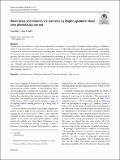Novel stress phonotactics are learnable by English speakers: Novel tone phonotactics are not
Author(s)
Bian, Yuan; Dell, Gary S
Download13421_2019_Article_1000.pdf (462.3Kb)
Publisher with Creative Commons License
Publisher with Creative Commons License
Creative Commons Attribution
Terms of use
Metadata
Show full item recordAbstract
Abstract
Speech errors are sensitive to newly learned phonotactic constraints. For example, if speakers produce strings of syllables in which /f/ is an onset if the vowel is /æ/, but a coda if the vowel is /I/, their slips will respect that constraint after a period of sleep. Constraints in which the contextual factor is nonlinguistic, however, do not appear to be learnable by this method—for example, /f/ is an onset if the speech rate is fast, but /f/ is a coda if the speech rate is slow. The present study demonstrated that adult English speakers can learn (after a sleep period) constraints based on stress (e.g., /f/ is an onset if the syllable is stressed, but /f/ is a coda if the syllable is unstressed), but cannot learn analogous constraints based on tone (e.g., /f/ is an onset if the tone is rising, but /f/ is a coda if the tone is falling). The results are consistent with the fact that, in English, stress is a relevant lexical phonological property (e.g., “INsight” and “inCITE” are different words), but tone is not (e.g., “yes!” and “yes?” are the same word, despite their different pragmatic functions). The results provide useful constraints on how consolidation effects in learning may interact with early learning experiences.
Date issued
2019-12-26Department
Massachusetts Institute of Technology. Department of Brain and Cognitive SciencesPublisher
Springer US